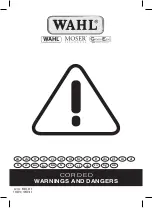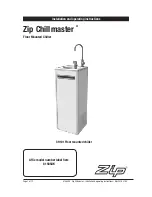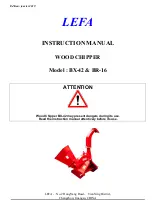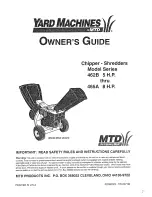
Bandit
Copyright 9/07
PAGE 7
MODEL 1850
Only Bandit knives and hardware are recommended for use in your Bandit chippers. Only then can you be
assured of a quality product that fits and performs the best to the standards of excellence that is expected from
the Bandit chipper.
KNIFE CHANGING PROCEDURE
CHIPPER SECTION
.
Before attempting any type of maintenance disengage clutch, install clutch lock if equipped, turn off
engine, wait for the disc/drum to come to a complete stop, install the disc/drum lock pin, disconnect
battery, and make sure the ignition key is in your possession.
. Disconnect the chipper hood engine disable plug.
3. Remove the padlock from the hood pin.
4. On disc chippers, recess the spring lock for the hood pin and retract the hood pin. On drum chippers,
retract the hood pin.
. Carefully open the hinged part of the chipper hood. Do not slam the chipper hood to the open position.
This will cause damage to the hinge. If the hinge becomes damaged by slamming the hood open,
replace the hinge immediately! If the hinge has become damaged, it will cause misalignment of the
hood, the chipper disc/drum may hit the hood and cause a serious accident!
6. Changing the chipper knives is a two person job. One person, using a wooden block, holds the
chipper knife in place while the other person removes the chipper knife hardware. Remove all of the
knives in each pocket. If the machine is a disc chipper with 5/8” knife bolts, typically a 3/8” allen key and
a 1 1/16” socket is required to change or torque the knife hardware. If the machine is a disc chipper
with 1/2” knife bolts, typically a 5/16” allen key and a 7/8” socket is required to change or torque the
knife hardware. If the machine is a drum chipper, typically a 15/16” socket is required to change
or torque the knife hardware.
7. Once the knives have been removed, inspect the knife pocket. Check for secure welds, excessive wear,
impact cracks, and elongated bolt holes on disc chippers or the condition of the knife bolt threads on
drum chippers. If a problem is found, contact your local dealer or Bandit Industries.
8. Clean out the knife pocket at this time. Remove all debris from the pocket and knife bolt holes.
9. Sharpen, rotate, or replace the chipper knife. Knives should be professionally ground, maintaining angle
and dimensional specifications. Knives should be replaced in sets. These sets are determined by the
amount of resharpening done to the knives. It should be reinstalled with another knife of comparable
usage. It helps to keep the disc/drum balanced, and it helps maintain chip quality.
Do not allow the
knives to wear beyond the absolute minimum specified distance from the center line of the bolt hole.
Reinstall the chipper knives. Make sure to properly torque the knife hardware, see Bolt Torque Chart.
Knife mounting hardware must be replaced after maximum of 4 - 5 knife rotations/changes to in sure
safe clamping ability. All knives and knife mounting hardware must be factory approved.
10. Remove the disc/drum lock pin. Very carefully, manually with a bar, turn the chipper disc/drum to the
next knife pocket. Reinstall the disc/drum lock pin.
11. Repeat steps 6 though 10, for each knife pocket.
12. Once the knives have been changed or rotated, check the anvil clearance. Make sure the clearance is
maintained to the specified distance from the highest knife. Do Not under any circumstance attempt to
rotate the chipper disc/drum while someone is inside the infeed hopper. They may become seriously
injured, Do Not Do This!
13. Close the hinged part of the chipper hood and reinstall the hood pin, hood pin padlock, chipper hood
disable plug, and on disc chippers make sure the spring lock for the hood pin springs back into position.
DANGER
Chipper knives are sharp and can be dangerous. It is always necessary for your protection to be extra careful
and wear leather gloves when handling knives. Before changing knives make sure all shut down procedures
are followed.
















































